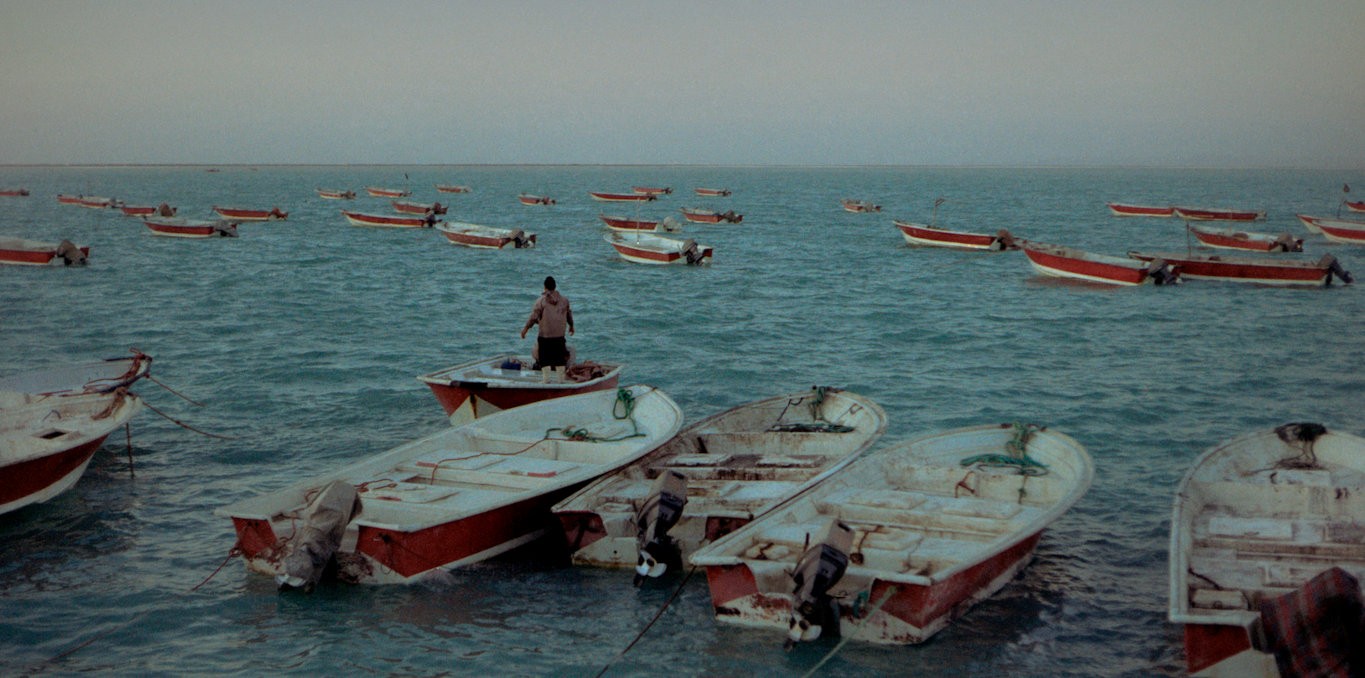Meezan

Set in south-western Iran, in the province of Khuzestan and bordering with Iraq, _Meezan_ (scale) is an observational and immersive experience, a journey from the sea to the land, about labor at the margins of petro-capitalism in three chapters. Despite the massive industrialization of the region, waterways of Khuzestan remain a significant source of income for the native communities who are most intimately connected to these embattled landscapes. _Meezan_ is a reflection on the relation between bodies and scales to acknowledge the weight of the past and its consequences in the present.
| Director | Shahab Mihandoust |
| Actor | Frédéric Savard |
| Share on |
An immersive documentary that demands attentive listening, Meezan transports us to the heart of the Anthropocene, along the shores of Iran, where a group of fishermen struggle to preserve their way of life and sustain an ancestral tradition now on the brink of extinction. In parallel, women work tirelessly in a modern shrimp-processing factory—time and labor embodied in two contrasting rhythms.
After years of war and oil exploitation, the banks of Abadan are irreversibly polluted. The nets come back nearly empty, the fish are in poor condition, and fishing yields little. And yet, the work continues—persisting, fishing—for the world to go on…
A realist, working-class portrait filmed in the style of cinéma vérité, Meezan places particular emphasis on listening, with an exceptional sound design by Ernst Karel, composed entirely of field recordings captured during production. The result is an immersive, contemplative audiovisual experience that invites us to reflect on the connections between bodily movement, labor, territory, and the memory embedded within them.
Watching Meezan, one can’t help but imagine the improbable collaboration of Pierre Perrault and Abbas Kiarostami. The film recalls both masters—in form and in spirit—as Shahab Mihandoust and his team document a vanishing tradition while offering a contemplative visual and auditory meditation on time, and on the space occupied by moving bodies within a geography transformed by human presence. It feels like a transcendental version of cinéma direct, attuned to the practice of “deep listening.”
Frédéric Savard
Archivist and programmer

-

Français
1h12
Language: Français -

English
1h12
Language: English
- Année 2023
- Pays Canada, Iran
- Durée 72
- Producteur Shahab Mihandoust
- Langue Farsi, Arab
- Sous-titres French, English
- Résumé court An observational and immersive experience, a journey from sea to land in south-western Iran, tracing labor at the margins of fossil capitalism.
- Mention festival New Visions Award · RIDM 2023
- Ordre 3
- TLF_Applismb_CA 1
- Date édito CA 2025-09-19
An immersive documentary that demands attentive listening, Meezan transports us to the heart of the Anthropocene, along the shores of Iran, where a group of fishermen struggle to preserve their way of life and sustain an ancestral tradition now on the brink of extinction. In parallel, women work tirelessly in a modern shrimp-processing factory—time and labor embodied in two contrasting rhythms.
After years of war and oil exploitation, the banks of Abadan are irreversibly polluted. The nets come back nearly empty, the fish are in poor condition, and fishing yields little. And yet, the work continues—persisting, fishing—for the world to go on…
A realist, working-class portrait filmed in the style of cinéma vérité, Meezan places particular emphasis on listening, with an exceptional sound design by Ernst Karel, composed entirely of field recordings captured during production. The result is an immersive, contemplative audiovisual experience that invites us to reflect on the connections between bodily movement, labor, territory, and the memory embedded within them.
Watching Meezan, one can’t help but imagine the improbable collaboration of Pierre Perrault and Abbas Kiarostami. The film recalls both masters—in form and in spirit—as Shahab Mihandoust and his team document a vanishing tradition while offering a contemplative visual and auditory meditation on time, and on the space occupied by moving bodies within a geography transformed by human presence. It feels like a transcendental version of cinéma direct, attuned to the practice of “deep listening.”
Frédéric Savard
Archivist and programmer
-

Français
Duration: 1h12Language: Français1h12 -

English
Duration: 1h12Language: English1h12
- Année 2023
- Pays Canada, Iran
- Durée 72
- Producteur Shahab Mihandoust
- Langue Farsi, Arab
- Sous-titres French, English
- Résumé court An observational and immersive experience, a journey from sea to land in south-western Iran, tracing labor at the margins of fossil capitalism.
- Mention festival New Visions Award · RIDM 2023
- Ordre 3
- TLF_Applismb_CA 1
- Date édito CA 2025-09-19
